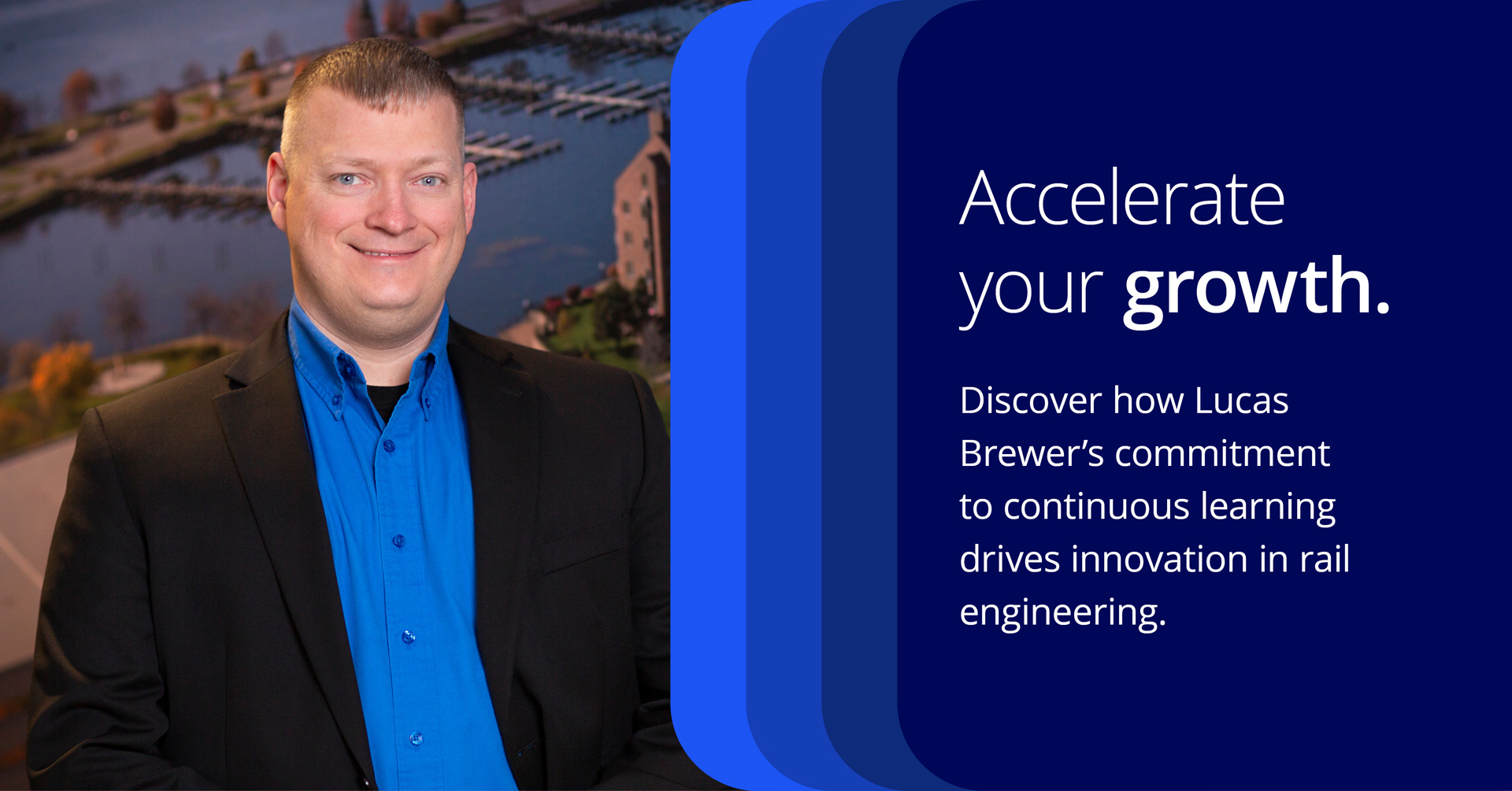A Testament to Continuous Learning in Rail Engineering with Lucas Brewer

In the ever-evolving field of civil engineering, continuous learning stands as a cornerstone for success and innovation. Lucas Brewer, the Rail Geographic Discipline Leader for Colliers Engineering & Design, exemplifies this value. With a background steeped in military discipline and a career that spans over a decade with the firm, Lucas’ journey is a testament to the power of adaptability, continuous learning, and effective communication. We recently sat with Lucas to learn more about his journey and how he continues to adapt and grow even today.
From the Army to Engineering: A Learning Journey
Lucas’ journey into civil engineering began unconventionally. “My degree in college was business and politics, and I was on a pre-law track,” Lucas recalled. However, his time as an Engineer Officer in the US Army Corps during deployments in Iraq ignited a passion for engineering.
“Doing bridge ratings and learning the basics of engineering got me down the path of doing engineering in the rail industry,” he explained. “I transferred the experience and knowledge from what the US Army taught me directly into bridge engineering and safe load capacities for the railroad.”
Lucas’s military background instilled in him a discipline for continuous learning and improvement. “Always be taking that next course, getting the next degree, attending the next school. The lessons learned there are far more than just for the military or one career; you can use them for everything you do,” he emphasized. This mindset has been pivotal in his transition from military service to a successful engineering career.
A Decade of Growth at Colliers Engineering & Design
Since joining Colliers Engineering & Design ten years ago, Lucas has seen significant evolution in the rail industry. “When I first started, there wasn’t much public funding available for railroads. They did simple engineering and only hired an engineer when absolutely necessary,” Lucas explained. Today, increased federal and state funding has changed the landscape, requiring full NEPA compliance and extensive engineering design, driving small railroads to seek additional services from firms like Colliers.
Lucas’s role involves overseeing rail projects, ensuring safety and compliance, and leveraging federal funding to improve rail infrastructure. His ability to adapt to these changes and continuously enhance his skills has been crucial to his success. “You have to keep learning to stay ahead. Each year, additional requirements are added, making the process more complicated. It’s a constant evolution, and you have to work through it,” he shared.
The Role of Soft Skills in Continuous Learning
Lucas highlighted the importance of soft skills, particularly communication, in advancing his career. “Communication is one of the most difficult challenges. I’ve seen myself as an introvert at times and wasn’t really good at talking with people effectively. Over the years, through self-study and developing communication skills, I learned how to build relationships and influence others. These skills are essential for growth.”
His commitment to improving his soft skills has not only advanced his career but also enhanced his ability to lead and mentor others within the firm. He shared that building relationships and influencing others are critical components of effective leadership and project management. “Continuous learning isn’t just about technical skills; it’s about personal growth and development as well,” Lucas explained.
Safety First: Extending Knowledge to the Public
Two memorable incidents have shaped Lucas’s approach to safety in railroad operations. He recounts a tragic trespass fatality that underscored the dangers of rail environments, which ultimately was a catalyst for him joining Operation Lifesaver, Inc. Lucas extended his commitment to safety beyond just the engineering community, aiming to educate the public, reducing incidents and fostering a culture of safety around railroads.
Another significant incident involved a derailment investigation, highlighting the complexities and challenges of ensuring safety and compliance. “In one instance, we had to investigate the derailment of a freight train, which required a detailed analysis of track conditions, train operations, and maintenance records,” Lucas explained. “Such incidents underscore the importance of rigorous safety protocols and continuous monitoring.”
Navigating Complex Regulations
Lucas’ role involves navigating the complexities of grant applications and federal regulations. “Each year, additional requirements are added, making the process more complicated. It’s a constant evolution, and you have to work through it,” he explained, going on to say that he relies on the expertise within Colliers Engineering & Design to stay up-to-date and ensure compliance. “We have experts across multiple disciplines. It’s important to know who to talk to and bring them in on the team.”
Future Opportunities and Challenges
Looking ahead, Lucas sees significant opportunities and challenges within the rail industry, particularly with the funding provided by the Infrastructure Investment and Jobs Act (IIJA). “The IIJA has put a massive amount of funding into the system, but it comes with strings attached, like Buy America requirements,” he noted. The challenge is not just for the rail industry but also for the American economy to develop the industrial capabilities to meet these requirements.
As he continues to lead rail projects for Colliers Engineering & Design, his unique experiences and insights will undoubtedly continue to drive success and innovation in the rail industry. “I can’t wait to see what the future holds and how we can continue to accelerate success for our clients and communities.”

Comments are closed.